新概念英语第二册第17课学习资料
- 格式:ppt
- 大小:1.90 MB
- 文档页数:35
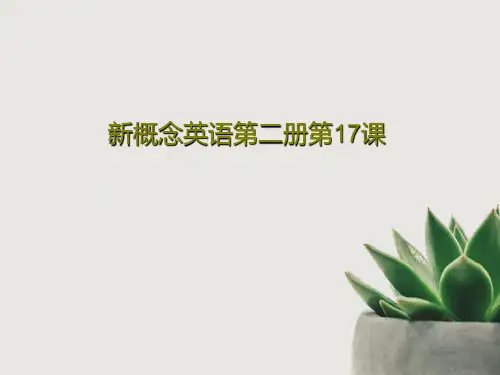
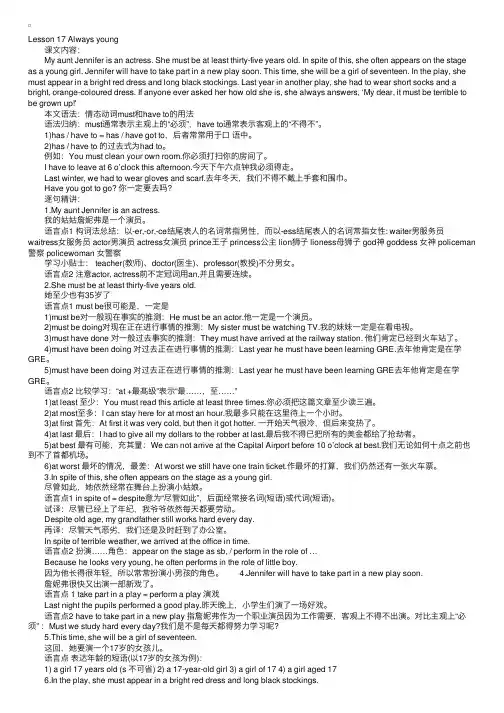
Lesson 17 Always young 课⽂内容: My aunt Jennifer is an actress. She must be at least thirty-five years old. In spite of this, she often appears on the stage as a young girl. Jennifer will have to take part in a new play soon. This time, she will be a girl of seventeen. In the play, she must appear in a bright red dress and long black stockings. Last year in another play, she had to wear short socks and a bright, orange-coloured dress. If anyone ever asked her how old she is, she always answers, ‘My dear, it must be terrible to be grown up!' 本⽂语法:情态动词must和have to的⽤法 语法归纳:must通常表⽰主观上的“必须”,have to通常表⽰客观上的“不得不”。
1)has / have to = has / have got to,后者常常⽤于⼝语中。
2)has / have to 的过去式为had to。
例如:You must clean your own room.你必须打扫你的房间了。
I have to leave at 6 o’clock this afternoon.今天下午六点钟我必须得⾛。
Last winter, we had to wear gloves and scarf.去年冬天,我们不得不戴上⼿套和围⼱。
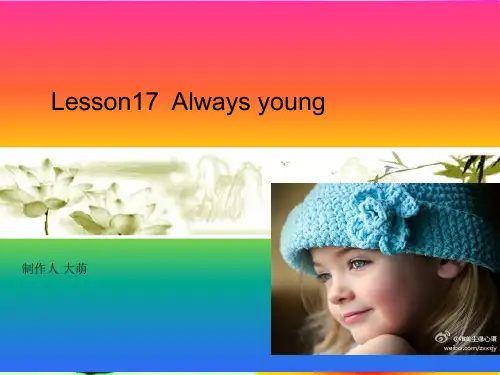
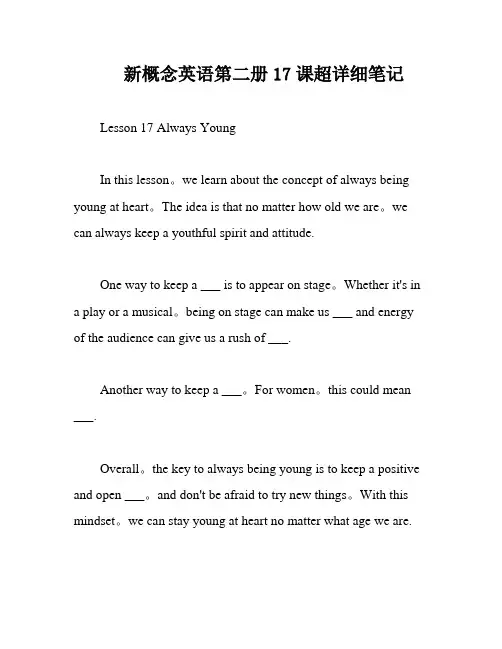
新概念英语第二册17课超详细笔记Lesson 17 Always YoungIn this lesson。
we learn about the concept of always being young at heart。
The idea is that no matter how old we are。
we can always keep a youthful spirit and attitude.One way to keep a ___ is to appear on stage。
Whether it's in a play or a musical。
being on stage can make us ___ and energy of the audience can give us a rush of ___.Another way to keep a ___。
For women。
this could mean ___.Overall。
the key to always being young is to keep a positive and open ___。
and don't be afraid to try new things。
With this mindset。
we can stay young at heart no matter what age we are.___-five years old。
This means that my aunt Jennifer is not a young girl anymore。
Despite her age。
she often plays the role of a young girl on stage.2、Jennifer will have to take part in a new play soon。
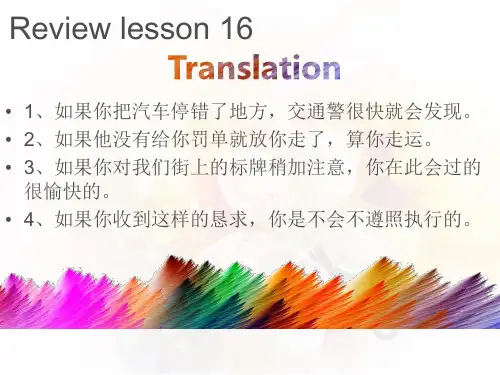
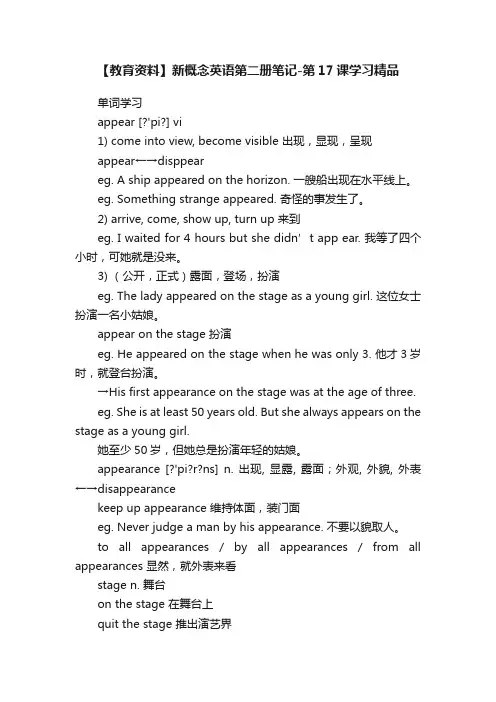
【教育资料】新概念英语第二册笔记-第17课学习精品单词学习appear [?'pi?] vi1) come into view, become visible 出现,显现,呈现appear←→disppeareg. A ship appeared on the horizon. 一艘船出现在水平线上。
eg. Something strange appeared. 奇怪的事发生了。
2) arrive, come, show up, turn up 来到eg. I waited for 4 hours but she didn’t app ear. 我等了四个小时,可她就是没来。
3) (公开,正式)露面,登场,扮演eg. The lady appeared on the stage as a young girl. 这位女士扮演一名小姑娘。
appear on the stage 扮演eg. He appeared on the stage when he was only 3. 他才3岁时,就登台扮演。
→His first appearance on the stage was at the age of three.eg. She is at least 50 years old. But she always appears on the stage as a young girl.她至少50岁,但她总是扮演年轻的姑娘。
appearance [?'pi?r?ns] n. 出现, 显露, 露面;外观, 外貌, 外表←→disappearancekeep up appearance 维持体面,装门面eg. Never judge a man by his appearance. 不要以貌取人。
to all appearances / by all appearances / from all appearances 显然,就外表来看stage n. 舞台on the stage 在舞台上quit the stage 推出演艺界in the international stage 在国际舞台上scene 舞台上的场景,背景eg. The first scene of the play is in the palace. 这部戏的第一个场景是在宫殿里。
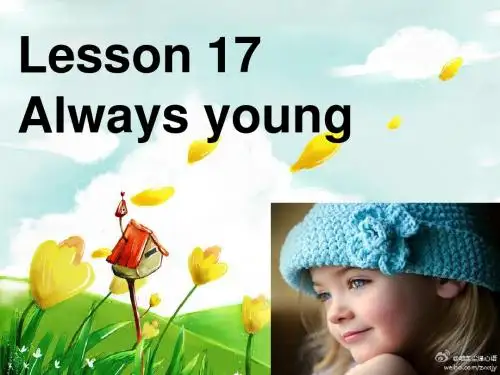
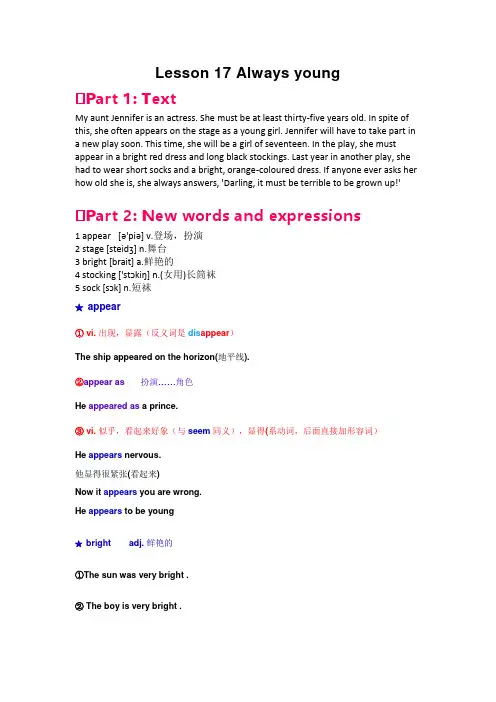
Lesson 17 Always youngPart 1: TextMy aunt Jennifer is an actress. She must be at least thirty-five years old. In spite of this, she often appears on the stage as a young girl. Jennifer will have to take part in a new play soon. This time, she will be a girl of seventeen. In the play, she must appear in a bright red dress and long black stockings. Last year in another play, she had to wear short socks and a bright, orange-coloured dress. If anyone ever asks her how old she is, she always answers, 'Darling, it must be terrible to be grown up!' Part 2: New words and expressions1 appear [ə'piə] v.登场,扮演2 stage [steidʒ] n.舞台3 bright [brait] a.鲜艳的4 stocking ['stɔkiŋ] n.(女用)长筒袜5 sock [sɔk] n.短袜★ appear① vi. 出现,显露(反义词是dis appear)The ship appeared on the horizon(地平线).②appear as 扮演……角色He appeared as a prince.③ vi. 似乎,看起来好象(与seem同义),显得(系动词,后面直接加形容词)He appears nervous.他显得很紧张(看起来)Now it appears you are wrong.He appears to be young★ bright adj. 鲜艳的①The sun was very bright .② The boy is very bright .③ He has a bright future.bright red 鲜红色;bright yellow 明黄色;bright blue 宝蓝色★ stage n. 舞台on the stage:在舞台上in the stage:在某一阶段,时期in the early stage in our history 。
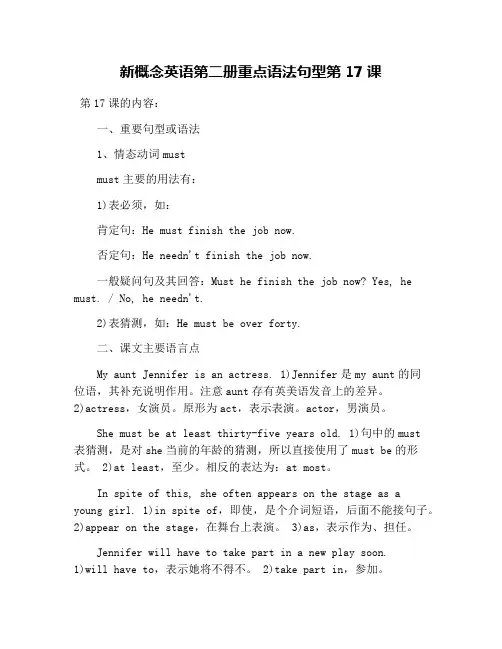
新概念英语第二册重点语法句型第17课第17课的内容:一、重要句型或语法1、情态动词mustmust主要的用法有:1)表必须,如:肯定句:He must finish the job now.否定句:He needn't finish the job now.一般疑问句及其回答:Must he finish the job now? Yes, he must. / No, he needn't.2)表猜测,如:He must be over forty.二、课文主要语言点My aunt Jennifer is an actress. 1)Jennifer是my aunt的同位语,其补充说明作用。
注意aunt存有英美语发音上的差异。
2)actress,女演员。
原形为act,表示表演。
actor,男演员。
She must be at least thirty-five years old. 1)句中的must表猜测,是对she当前的年龄的猜测,所以直接使用了must be的形式。
2)at least,至少。
相反的表达为:at most。
In spite of this, she often appears on the stage as a young girl. 1)in spite of,即使,是个介词短语,后面不能接句子。
2)appear on the stage,在舞台上表演。
3)as,表示作为、担任。
Jennifer will have to take part in a new play soon.1)will have to,表示她将不得不。
2)take part in,参加。
This time, she will be a girl of seventeen. 1)this time后面用逗号隔开,起到强调作用,凸显这次她要扮演的角色。
2)a girl of seventeen,十七岁的女孩。
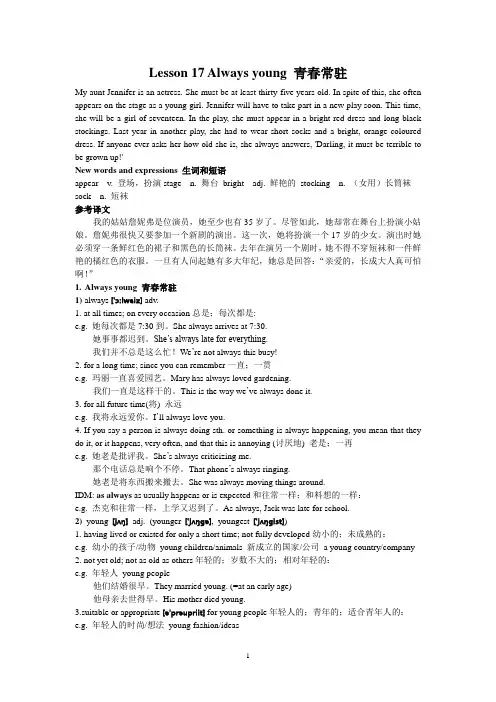
Lesson 17 Always young 青春常驻My aunt Jennifer is an actress. She must be at least thirty-five years old. In spite of this, she often appears on the stage as a young girl. Jennifer will have to take part in a new play soon. This time, she will be a girl of seventeen. In the play, she must appear in a bright red dress and long black stockings. Last year in another play, she had to wear short socks and a bright, orange-coloured dress. If anyone ever asks her how old she is, she always answers, 'Darling, it must be terrible to be grown up!'New words and expressions 生词和短语appear v. 登场,扮演stage n. 舞台bright adj. 鲜艳的stocking n. (女用)长筒袜sock n. 短袜参考译文我的姑姑詹妮弗是位演员,她至少也有35岁了。
尽管如此,她却常在舞台上扮演小姑娘。
詹妮弗很快又要参加一个新剧的演出。
这一次,她将扮演一个17岁的少女。
演出时她必须穿一条鲜红色的裙子和黑色的长筒袜。
去年在演另一个剧时,她不得不穿短袜和一件鲜艳的橘红色的衣服。
一旦有人问起她有多大年纪,她总是回答:“亲爱的,长成大人真可怕啊!”1.Always young 青春常驻1) always [ˈɔ:lweiz] adv.1. at all times; on every occasion总是;每次都是:e.g. 她每次都是7:30到。
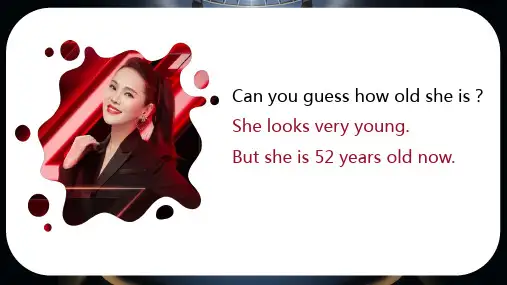
逐句精讲新概念英语第二册:第17课青春常驻Lesson 17 Always young课文内容:My aunt Jennifer is an actress. She must be at least thirty-five years old. In spite of this, she often appears on the stage as a young girl. Jennifer will have to take part in a new play soon. This time, she will be a girl of seventeen. In the play, she must appearin a bright red dress and long black stockings. Last year in another play, she had to wear short socks and a bright, orange-coloured dress. If anyone ever asked her how old she is, she always answers, ‘My dear, it must be terrible to be grown up!'本文语法:情态动词must和have to的用法语法归纳:must通常表示主观上的“必须”,have to通常表示客观上的“不得不”。
1)has / have to = has / have got to,后者常常用于口语中。
2)has / have to 的过去式为had to。
例如:You must clean your own room.你必须打扫你的房间了。
I have to leave at 6 o’clock this afternoon.今天下午六点钟我必须得走。
Last winter, we had to wear gloves and scarf.去年冬天,我们不得不戴上手套和围巾。
新概念英语第二册:第17课课文详解及语法解析课文详注 Further notes on the text1.She must be at least thirty-five years old.她至少也有35岁了。
(1)at least 是一固定短语,表示“至少”:He borrowed at least five books from the library.他从图书馆至少借了5本书。
If you can't clean the car, you can at least help me to clean it.如果你不能擦车,你至少能够帮我擦。
(2)我们已学过两种年龄表示法。
一种是“数字+years old”,作表语:My father is fifty-seven years old now.我父亲现在已57岁了。
另一种是“数字+ -year-old”,作定语:Last week, my four-year-old daughter, Sally, was invited to a children's party.上周,我4岁的女儿萨莉应邀去参加一个儿童晚会。
2.In spite of this…即使如此……(1)in spite of为固定短语,意为“不管”、“即使”,后面能够跟名词、代词或从句:In spite of the rain, they went on their journey.即使下雨,他们还是继续旅行。
In spite of what you have said about her, she is much better than Mary.不管你说她什么,她比玛丽要好得多。
(2)this 代指上句话,即“她至少也有35岁”这个事实。
3.This time, she will be a girl of seventeen.这个次,她将扮演一个17岁的少女。
Lesson 17 Always young 青春常驻学习目标全解必记单词appear v. 登场,扮演stage n. 舞台bright adj. 鲜艳的stocking n. (女用)长筒袜sock n. (男女通用)短袜常考短语in spite of 尽管take part in 参加(某一种活动)grow up 长大,成熟at least 至少at most 至多a girl of seventeen 一个十七岁的女孩orange-colored dress 橘红色的连衣裙on the stage 在舞台上经典句型1.She must be at least thirty-five years old.2.Jennifer will have to take part in a new play soon.st year in another play, she had to wear short socks and abright red dress and long black stockings,4.It must be terrible to be grown up.重点语法语法一:must,have to,have got tomust have to have got tomust not(mustn’t) don’t have to haven’t got toMust sb…? Do/Does sb have to…? Have/Has sbto…?1)must表示“必须”a.可用于肯、否、疑问句时,否定形式mustn’t表示“禁止”,“不允许”,“一定不要”b.must一般只用于现在时和将来时,要在过去表示“必须”的意思用had toc.must开头的一般疑问句,若否定回答,用needn’t,不用mustn’t.eg: Must I clean all the room?No,you needn’t.补充:must 和have to、have got to 区别a. must:表达主观的看法,认为有义务或责任去做某事,have to和have got to 侧重于客观需要,有“不得不”、“被迫”之意。